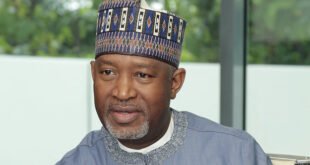For a nation that once towered as West Africa’s agricultural beacon, Nigeria’s gradual slide into food import dependency was an unheralded catastrophe, largely accepted with a shrug and managed through unsustainable quick fixes. Today, however, the landscape is shifting dramatically. Under the purposeful leadership of Senator Abubakar Kyari, the Federal Ministry of Agriculture and Food Security is orchestrating a bold and strategic revival. What we are witnessing is not a cosmetic intervention or a fanfare-driven gimmick. This is a calibrated, investment-laden, mechanised, research-anchored, and youth-inclusive overhaul, fully aligned with President Bola Ahmed Tinubu’s Renewed Hope Agenda.
From the sun-drenched rice paddies of Kebbi to wheat fields in Kano, from the hum of tractors in rural service centres to credit flowing into the hands of smallholder farmers, a new green revolution is taking root. It is one that promises to not only feed Nigerians but also elevate agriculture as the cornerstone of national prosperity and regional leadership.
This is a story of ambition anchored in realism. Senator Kyari, a seasoned legislator turned results-driven technocrat, has injected clarity, competence, and a delivery-focused ethos into a sector long haunted by inefficiency, policy inconsistency, and underutilised potential. In less than two years, his stewardship has seen the deployment of over ₦200 billion in strategic agricultural interventions, the recapitalisation of the Bank of Agriculture to the tune of ₦1.5 trillion, the rollout of 2,000 tractors, and the emergence of thousands of smallholder farmers as self-sufficient agri-entrepreneurs. These are not abstract metrics; they are the tangible building blocks of a food-secure, economically vibrant Nigeria whose growing influence is reverberating across the West African subregion.
● A Mandate Rooted in Urgency
When President Tinubu declared a state of emergency on food security in mid-2023, it was not mere rhetoric. It was a definitive call to arms, a national rallying cry that placed food sovereignty at the heart of Nigeria’s development priorities.
Moreover, the rechristening of the Ministry from Agriculture and Rural Development to Agriculture and Food Security was not merely symbolic. It was a statement of strategic realignment, one that demanded execution, not excuses.

Into this critical role stepped Senator Kyari, whose appointment in August 2023 marked the beginning of a new policy orientation. Avoiding unnecessary theatrics, he has mobilised his team and national resources to deliver real results. Over ₦200 billion has been channelled to support more than five million smallholder farmers with essential inputs, including fertilisers worth ₦215,000 per farmer, distributed at no cost.
Senator Kyari’s guiding principle is succinct and unambiguous: “We must achieve food security and food sovereignty.” This goal is not aspirational; it is foundational to Nigeria’s survival and stature in a volatile world.
● Mechanisation: Driving Efficiency, Restoring Dignity
The unveiling of 2,000 tractors under the Greener Hope Large-Scale Mechanisation Programme in June 2025 was more than a photo opportunity. To be clear, it was a strategic dismantling of the antiquated, labour-intensive farming culture that has long discouraged Nigeria’s youth.
According to Senator Kyari, “We have a huge capacity within our youths, but the drudgery involved scares them away.” With these machines now servicing farming clusters across the nation, agriculture is being rebranded as a dignified, modern profession fit for a 21st-century workforce.
For full clarity, the strategy does not end with the new hardware. In partnership with the Food and Agriculture Organisation and private sector players, the Ministry is establishing mechanisation service centres in key agrarian zones. These centres offer not just equipment, but a bundle of services. These include extension support, maintenance, and market linkages. The emphasis is on access, not ownership. Farmers, even with limited means, can now tap into world-class agricultural technology. The ripple effect is clear: higher productivity, reduced post-harvest losses, and a shift from subsistence to commercial farming.
● Research and Innovation: Cultivating Sovereignty from the Soil
Agriculture without research is an outdated gamble. Recognising this, the Ministry has turned Nigeria’s research institutes into engines of innovation. A shining example is the domestication of wheat seed production. From complete dependency on imported seeds in 2023, Nigeria now produces over 500 metric tonnes locally, a feat achieved within just a year. These seeds are not only high-yielding but are also bred to withstand erratic weather patterns, a crucial adaptation in an era of climate unpredictability.
Rice, the staple that fuels millions of households, has also witnessed a remarkable turnaround. Through a well-structured out-grower scheme, smallholders have transitioned from precarious farming to entrepreneurial farming. With guaranteed off-take agreements, improved irrigation infrastructure, and superior post-harvest handling, yields have doubled in areas like Kebbi. The impact has caught international attention. During a June 2025 visit to Abuja, The Gambian Minister of Agriculture, Dr Dembal Sabally, expressed deep admiration for Nigeria’s rice ecosystem and requested support to replicate the model in Banjul. Nigeria is no longer a passive recipient of foreign best practices; it is now an exporter of solutions.
● Agricultural Finance: Making Capital Work for the Soil
If agriculture is to be treated as a business, then capital must flow like blood to the organs of that business. The recapitalisation of the Bank of Agriculture with ₦1.5 trillion is a policy masterstroke. More than just a bailout, this investment is designed to catalyse growth across the entire agricultural value chain; from inputs to processing and exports. Specific funds have been earmarked for dry season farming, livestock development, agro-industrial clusters, and high-value export crops.
In synergy with the Bank of Industry and the Nigeria Education Loan Fund, the Ministry is unlocking access to structured, long-term capital for agri-preneurs. One standout innovation is the out-grower credit system, which allows farmers to access loans and repay within a four-to-five-month cycle.
This system has been so successful that countries like The Gambia are actively seeking technical guidance to adapt it. Moreover, the widespread distribution of fertiliser at no cost has significantly reduced production costs and increased profit margins, placing more power in the hands of producers rather than middlemen.
● Empowering the Youth, Embracing Inclusion
For Nigeria to sustain its agricultural resurgence, the next generation must be central to the agenda. Senator Kyari is acutely aware of this. Through a comprehensive youth engagement strategy, the Ministry is attracting young Nigerians back to the land. Not with rhetoric, but with results.
Over 650,000 youths have already benefited from skills acquisition initiatives in precision farming, agritech, agro-processing, and agribusiness management. The Digital Training Academy serves as the nerve centre for this revolution. In states as diverse as Kano, Enugu, and Rivers, young people are taking the opportunity to create wealth through agriculture, breathing new life into rural economies and stabilising migration trends.
Equally commendable is the Ministry’s emphasis on equity. Through affirmative procurement policies, women, youth-led cooperatives, and local contractors are prioritised in project implementation. This deliberate inclusion is not just good policy, it is essential for the resilience of the agricultural ecosystem. This new approach stems from the understanding that development which excludes half the population is not development at all.
● Regional Leadership: Nigeria Steps Up
Nigeria’s agricultural metamorphosis is capturing regional attention. The June 2025 visit by The Gambia’s agricultural delegation is just the latest in a string of engagements. What makes this remarkable is the reversal of roles. Once a net importer of food and agricultural ideas, Nigeria is now a regional mentor and partner. The out-grower schemes, irrigation models, seed replication techniques, and mechanisation hubs developed under Kyari’s watch are serving as templates for countries across West Africa.

Multilateral partnerships are amplifying this impact. AFREXIM Bank’s commitment of $200 million to Nigeria’s agriculture and creative sectors is a major vote of confidence. So too is the deepening collaboration with the United Nations’ FAO, which continues to provide technical support. These alliances not only bring funding but also facilitate technology transfer and policy learning, placing Nigeria firmly at the helm of Africa’s agricultural resurgence.
● Climate-Smart Agriculture: Resilience as Policy
In an era of rising temperatures, shifting rainfall patterns, and extreme weather events, the importance of climate resilience cannot be overstated. Senator Kyari’s Ministry is embedding climate-smart agriculture into its foundational policies. Research institutions under its umbrella are developing drought-tolerant and flood-resistant crop varieties. Across northern Nigeria, solar-powered irrigation systems are helping farmers navigate seasonal unpredictability. In flood-prone zones, adaptive cropping calendars and disaster recovery interventions are being scaled to protect livelihoods and reduce vulnerability.
The Ministry’s interventions are a clear recognition that the future of agriculture depends not just on productivity, but on sustainability.
● Confronting Challenges with Vision
It would be disingenuous to claim that the path ahead is without obstacles. Implementation bottlenecks, infrastructure deficiencies, especially in transportation and electricity, persist. Cultural resistance to mechanised farming in some regions presents another layer of complexity. Yet, the Ministry’s response has been far from passive.
Through initiatives like the Adopt-a-Farm scheme, public and private actors are co-investing in agricultural modernisation. New road projects are being designed to include feeder routes to farmlands. Mobile extension services and digital platforms are helping to change mindsets, one farm at a time. A culture of accountability is also emerging, with citizens now able to track projects via public dashboards.
● Institutionalising Progress for Posterity
The most impressive achievements mean little if they are not safeguarded against political cycles. The establishment of a National Agricultural Endowment Foundation is a strategic move to institutionalise innovation funding beyond electoral timelines. Likewise, the impending launch of an Agricultural Management Information System will provide real-time data to guide policymaking and eliminate waste.
The Ministry has also adopted “Reform Sprints”. These are 90-day delivery cycles that emphasise speed, transparency, and citizen feedback. This model ensures that momentum is not lost and that the public remains an active participant in Nigeria’s agricultural renaissance.
● The Human Story Behind the Headlines
While statistics showcase the scale of progress, the real measure of success is in human transformation. In Kebbi, a farmer sees his rice yield triple after decades of stagnation. In Kano, a young woman opens an agro-processing facility employing ten others. In Bayelsa, a community now enjoys lower food prices because local production has replaced imports. These are the stories that matter.
● A New Agricultural Dawn Beckons
Senator Abubakar Kyari’s leadership of the Federal Ministry of Agriculture and Food Security is sowing more than crops. It is cultivating hope and belief. Belief that Nigeria can feed itself. Belief that agriculture can be a path to dignity, wealth, and global relevance. The question is no longer whether this is possible. It is how far, how fast, and how deeply the roots of this renaissance will grow.
With clear vision, strategic investment, and the full mobilisation of Nigeria’s agricultural potential, the answer resounds from farm to farm across the nation: the harvest of hope is here, the potential of belief is being realised. And it has only just begun.
■ Sufuyan Ojeifo, publisher/editor-in-chief of THE CONCLAVE online newspaper contributed this piece via [email protected] (08034727013)
Stay ahead with the latest updates!
Join The ConclaveNG on WhatsApp and Telegram for real-time news alerts, breaking stories, and exclusive content delivered straight to your phone. Don’t miss a headline — subscribe now!
 JamzNG Latest News, Gist, Entertainment in Nigeria
JamzNG Latest News, Gist, Entertainment in Nigeria









